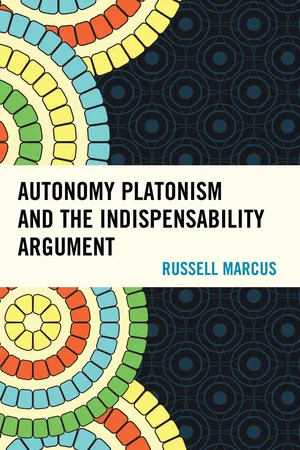
- English
- ePUB (mobile friendly)
- Available on iOS & Android
eBook - ePub
Autonomy Platonism and the Indispensability Argument
About this book
Mathematical platonism is the view that mathematical statements are true of real mathematical objects like numbers, shapes, and sets. One central problem with platonism is that numbers, shapes, sets, and the like are not perceivable by our senses. In contemporary philosophy, the most common defense of platonism uses what is known as the indispensability argument. According to the indispensabilist, we can know about mathematics because mathematics is essential to science.
Platonism is among the most persistent philosophical views. Our mathematical beliefs are among our most entrenched. They have survived the demise of millennia of failed scientific theories. Once established, mathematical theories are rarely rejected, and never for reasons of their inapplicability to empirical science.
Autonomy Platonism and the Indispensability Argument is a defense of an alternative to indispensability platonism. The autonomy platonist believes that mathematics is independent of empirical science: there is purely mathematical evidence for purely mathematical theories which are even more compelling to believe than empirical science.
Russell Marcus begins by contrasting autonomy platonism and indispensability platonism. He then argues against a variety of indispensability arguments in the first half of the book. In the latter half, he defends a new approach to a traditional platonistic view, one which includes appeals to a priori but fallible methods of belief acquisition, including mathematical intuition, and a natural adoption of ordinary mathematical methods. In the end, Marcus defends his intuition-based autonomy platonism against charges that the autonomy of mathematics is viciously circular. This book will be useful to researchers, graduate students, and advanced undergraduates with interests in the philosophy of mathematics or in the connection between science and mathematics.
Platonism is among the most persistent philosophical views. Our mathematical beliefs are among our most entrenched. They have survived the demise of millennia of failed scientific theories. Once established, mathematical theories are rarely rejected, and never for reasons of their inapplicability to empirical science.
Autonomy Platonism and the Indispensability Argument is a defense of an alternative to indispensability platonism. The autonomy platonist believes that mathematics is independent of empirical science: there is purely mathematical evidence for purely mathematical theories which are even more compelling to believe than empirical science.
Russell Marcus begins by contrasting autonomy platonism and indispensability platonism. He then argues against a variety of indispensability arguments in the first half of the book. In the latter half, he defends a new approach to a traditional platonistic view, one which includes appeals to a priori but fallible methods of belief acquisition, including mathematical intuition, and a natural adoption of ordinary mathematical methods. In the end, Marcus defends his intuition-based autonomy platonism against charges that the autonomy of mathematics is viciously circular. This book will be useful to researchers, graduate students, and advanced undergraduates with interests in the philosophy of mathematics or in the connection between science and mathematics.
Information
Table of contents
- Preface
- Acknowledgments
- Chapter One: Platonism: An Overview
- Chapter Two: The Quinean Indispensability Argument
- Chapter Three: Problems for QI
- Chapter Four: The Weasel
- Chapter Five: The Unfortunate Consequences
- Chapter Six: The Putnamian Indispensability Argument
- Chapter Seven: The Explanatory Indispensability Argument
- Chapter Eight: Motivating Autonomy Platonism
- Chapter Nine: Plenitudinous Platonism
- Chapter Ten: Intuition-Based Autonomy Platonism
- Chapter Eleven: Circles and Justification
- Chapter Twelve: Conclusions
- References
- About the Author
Frequently asked questions
Yes, you can cancel anytime from the Subscription tab in your account settings on the Perlego website. Your subscription will stay active until the end of your current billing period. Learn how to cancel your subscription
No, books cannot be downloaded as external files, such as PDFs, for use outside of Perlego. However, you can download books within the Perlego app for offline reading on mobile or tablet. Learn how to download books offline
Perlego offers two plans: Essential and Complete
- Essential is ideal for learners and professionals who enjoy exploring a wide range of subjects. Access the Essential Library with 800,000+ trusted titles and best-sellers across business, personal growth, and the humanities. Includes unlimited reading time and Standard Read Aloud voice.
- Complete: Perfect for advanced learners and researchers needing full, unrestricted access. Unlock 1.4M+ books across hundreds of subjects, including academic and specialized titles. The Complete Plan also includes advanced features like Premium Read Aloud and Research Assistant.
We are an online textbook subscription service, where you can get access to an entire online library for less than the price of a single book per month. With over 1 million books across 990+ topics, we’ve got you covered! Learn about our mission
Look out for the read-aloud symbol on your next book to see if you can listen to it. The read-aloud tool reads text aloud for you, highlighting the text as it is being read. You can pause it, speed it up and slow it down. Learn more about Read Aloud
Yes! You can use the Perlego app on both iOS and Android devices to read anytime, anywhere — even offline. Perfect for commutes or when you’re on the go.
Please note we cannot support devices running on iOS 13 and Android 7 or earlier. Learn more about using the app
Please note we cannot support devices running on iOS 13 and Android 7 or earlier. Learn more about using the app
Yes, you can access Autonomy Platonism and the Indispensability Argument by Russell Marcus in PDF and/or ePUB format, as well as other popular books in Philosophy & History & Philosophy of Mathematics. We have over one million books available in our catalogue for you to explore.